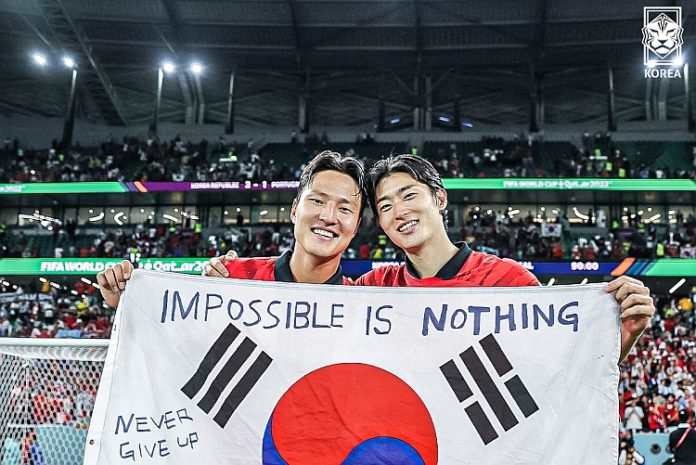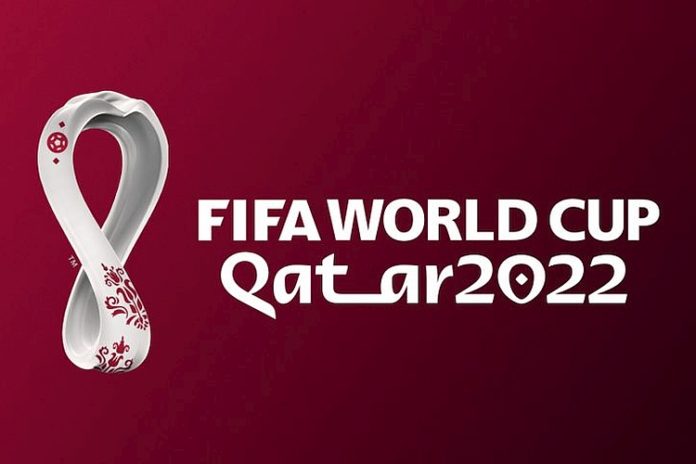★ The Sports Examiner: Chronicling the key competitive, economic and political forces shaping elite sport and the Olympic Movement.★
★ Want TheSportsExaminer.com insights for your team? Yes! Click here for info on speaking, research and consulting from editor Rich Perelman. ★
★ To get The Sports Examiner by e-mail: sign up here! ★
≡ QATAR 2022 ≡
More upsets at the FIFA World Cup, where group leaders Portugal and Brazil both rested some of their stars and both lost, but still finished atop their groups. The stunning wins for South Korea (2-1 over Portugal) and Cameroon (1-0 over Brazil) advanced only the Koreans, who eliminated Uruguay, which soundly beat Ghana, 2-0 (but needed a third goal to advance on goal differential).
In a rough-and-tumble game, Switzerland defeated Serbia, 3-2, to advance as the second team from Group G.
The group stage is over and the serious business of the elimination games begins with the Round of 16 on through Tuesday. Saturday’s match-ups include Netherlands and the U.S. and Argentina and Australia.
≡ Friday’s Matches ≡
● Group G: Cameroon 1, Brazil 0 ● The Brazilians rested most of their starters and used nine new players for this match, and immediately dominated possession, but could not score. They had chances, but forward Gabriel Martinelli missed a rising shot at 45+1 in perhaps the best opportunity of the half.
The Brazilians enjoyed 68% of possession, and had 10 shots at goal, but had to weather a creative Cameroon charge at 45+3 as Bryan Mbeumo headed a cross right at goal, but Brazilian keeper Ederson was able to slap it away. It was the first shot-on-goal against Brazil in the tournament so far.
Brazil was hard after a goal to start the second half, but Cameroon keeper Devis Epassy looked like a circus acrobat, swatting away shots and rebounds. He hit his head on a goalpost in the 58th minute off a corner that was headed by defender Bremer, but stayed in.
The Brazilian challenges kept coming, although the Indomitable Lions were able to mount a couple of dangerous chances – especially due to their speed – in the second half. In stoppage time, midfielder Jerome Ngom Mbekeli took a pass from midfield, sprinted down the right side and sent a perfect cross into the box that was redirected into the goal by striker Vincent Aboubakar at 90+2, to give Cameroon a 1-0 lead!
Aboubakar ripped off his shirt in celebration, earning him a yellow card and then a red card since he already had received one yellow, and leaving Cameroon to defend with 10. But the Brazilians could not score, with shot after shot on goal and suffered a 1-0 loss.
It was a glorious way for Cameroon to go out, with its first World Cup win since 2002. Brazil lost in a World Cup group match for the first time since 1998, ending a 17-match unbeaten string. The Brazilians ended with 65% possession and a 21-7 edge on shots, but none that found the net.
● Group G: Switzerland 3, Serbia 2 ● The Swiss (1-1) needed at least a draw and 0-1-1 Serbia had to win and hope Brazil beat Cameroon. Both sides had their offenses going from the start, with Swiss forward Xherdan Shaqiri scoring on a left-footer in the 20th from the right side – just inside the near post – off a feed from the middle of the box from midfielder Dijbril Sow.
But Serbia came right back, with a brilliant header from Aleksandar Mitrovic scoring in the 26th, redirecting – with power – a perfect lead pass from midfielder Dusan Tadic. The Serbs went up, 2-1, just nine minutes later, after Dusan Vlahovic got on to a deflected ball in the box and sent left-footed shot from left to right that rumbled past Swiss keeper Gregor Kobel.
The Swiss, who had scored one goal in two games coming up, tied it at 2-2 in the 44th minute as defender Silvan Widmer sent a perfect pass to the front of the box for a Breel Embolo tap-in to the left corner of the net. Possession in the first half was 50-50 and the Swiss had nine shots to seven for Serbia.
More offense in the second half, as Switzerland got on top with a Shaqiri pass into the box that was back-passed by midfielder Ruben Vargas to wide-open midfielder Remo Freuler, who finished with a left-footed cross to the right side of the goal for a 3-2 lead in the 48th minute.
But that was it and the game became increasingly physical, with a total of 32 fouls and 11 yellow cards, including seven on the Serbs and a scuffle in stoppage time. The game ended with Serbia holding 54% of possession, but the Swiss had 14 shots to 12 and a 7-4 edge on shots actually on goal. The Swiss finished the group at 2-1 and six points, behind Brazil by just one goal.
● Group H: South Korea 2, Portugal 1 ● The Portugese had already qualified to advance, having defeated Ghana and Uruguay, but the Koreans needed to win to have a shot at advancing. And Korean hopes dropped when forward Ricardo Horta scored from the right side of the box in the fifth minute.
But the Koreans stayed focused and worked relentlessly, getting the equalizer in the 27th when Young-gwon Kim scored into the center of the net as the ball bounced around in the box off a corner. Portugal had more chances, but the half ended 1-1, with Uruguay having a 10-6 edge on shots and 56% of possession.
As the second half wore on, the Koreans knew they needed a win and got stronger and stronger offensively, repeatedly making hard runs into the Portuguese zone. But nothing came of it until 90+1, when Heung-min Son led a fast break from his own zone and sent a pass into the middle of the box. A sprinting Hee-chan Hwang emerged and blasted a shot from right to left that found the left corner of the goal for a 2-1 lead that held up. The Koreans exploded with emotion when the game ended, and then again when it became clear they would advance to the elimination round for the first time since 2010.
Portugal had 62% of the possession in the game, but shots were even at 13-13, meaning the Koreans had seven second-half shots to get three for Portugal. Pressure paid off.
● Group H: Uruguay 2, Ghana 0 ● Uruguay’s situation going into this game was dire. After a 0-0 tie with South Korea and a 2-0 loss to Portugal, Uruguay had not scored a goal and had to win to have any chance of advancing and even then, had the problem of goal differential to consider. Ghana was 1-1 and could advance with a win and possibly a draw.
But after a scare, Uruguay took control and squashed Ghana’s hopes. Keeper Sergio Rochet saved a penalty against Ghana striker Andre Ayew in the 21st minute, then striker Luis Suarez’s shot was saved, but bounced to forward Giorgian de Arrascaeta who headed it in in the 26th for a 1-0 lead.
Suarez was in front of the Ghana goal again in the 32nd and sent a looping pass to de Arrascaeta to his left and he scored again on a powerful volley right to the back of the net for a 2-0 advantage. Uruguay had 58% of possession and a 5-3 lead in shots in the half.
Both sides had second-half chances, but Uruguay was fine as long as Korea and Portugal were tied in the other game, which would mean that Uruguay advanced. Then came the murmur in the Al Janoub Stadium when Korea scored at 90+1, meaning Uruguay and Korea would be tied with four points each and both would have a goal differential of zero. Then, Korea’s four total goals to Uruguay’s two would eliminate Uruguay. So the Uruguay offense went into hyper-drive with eight minutes of stoppage time available, needing to score one more goal.
The game ended with a 50-50 split on possession and Uruguay with a 12-10 edge on shots, but it was not enough. The Uruguay bench was screaming for penalties to be called on runs into the box by strikers Darwin Nunez and Edinson Cavani, but none were given and defender Jose Gimenez and Cavani received yellow cards for chasing referee Daniel Siebert (GER) into the field exit tunnel.
Uruguay failed to advance out of the group stage for the first time since 2002.
≡ PANORAMA ≡
The elimination matches are upon us and the Round of 16 begins on Saturday:
Game 1: 10 a.m. Eastern time:
● Netherlands (Group A-1): 2-0-1 ~ goals: 5-1
● United States (Group B-2): 1-0-2 ~ goals: 2-1
The U.S. is 1-4 in World Cup Round of 16 games going back to 1934. Its only win was a 2-0 whitewash of Mexico in 2002. The Netherlands is 4-1 against the U.S. all-time, all in friendlies.
The Dutch have played eight Round of 16 matches from 1974-2014, winning six, but did not qualify for the 2018 World Cup.
Game 2: 2 p.m. Eastern time:
● Argentina (Group C-1): 2-1 ~ goals: 5-2
● Australia (Group D-2) : 2-1 ~ goals: 3-4
Argentina has competed in 12 straight World Cup final tournaments in a row and was eliminated in this round in 2018. Prior to that, it had won four Round of 16 games in a row.
This is only the second time Australia had made the elimination round – also in 2006 – when the Socceroos lost to Italy, 1-0. Australia has never faced Argentina at the World Cup, but was the only team to make it to the elimination round this year with a negative goal differential.
The winners of these games will advance to the quarterfinals on 9 December. Sunday’s games include England vs. Senegal and France vs. Poland, with the winners to meet on 10 December.
¶
With the group stage and 48 matches concluded, a good time for a quick report card on the five continental groups that sent teams to Qatar:
Africa:
● 5 teams in and 2 qualified to the Round of 16
● Group Stage record: 7-5-3, and 4-1 in the third round of matches
● Group Stage offense: 19-17 goals, 152-167 on shots, 44% possession
Asia:
● 6 teams in and 3 qualified to the Round of 16
● Group Stage record: 7-10-1, and 3-3 on the third round of matches
● Group Stage offense: 19-30 goals, 176-239 shots, 40% possession
CONCACAF:
● 4 teams in and 1 qualified to the Round of 16
● Group Stage record: 3-6-3, but 2-2 in third round of matches
● Group Stage offense: 9-22 goals, 115-130 shots, 47% possession
Europe:
(record and statistics against only non-European teams)
● 13 teams in and 8 qualified to the Round of 16
● Group Stage record: 12-9-7 vs. non-European teams
● Group Stage offense: 45-28 goals, 322-310 shots, 57% possession
South America:
● 4 teams in and 2 qualified to the Round of 16
● Group Stage record: 6-4-2, and 2-2 in the third round of matches
● Group Stage offense: 14-8 goals, 163-82 shots, 57% possession
Europe had 10 qualifiers to the final 16 in 2018, out of 14 entries, and South America had four in the playoffs in Russia, plus one for Asia and one for CONCACAF. Africa and Asia – with five qualifiers combined – have shown the most improvement so far.
Asia’s three elimination-round qualifiers is its most ever; it had two in 2002 – when it was also the host – and 2010. The two for Africa equal the most ever, also in 2014. Europe’s eight is down from 2018, but better than the six qualifiers it had in 2010 and 2014. For CONMEBOL (South America), two qualifiers for the playoffs is its worst showing since 2002 (also 2); it had five qualifiers in 2010 and 2014.
The takeaway is that, in terms of on-the-field performance, where the World Cup is played matters a lot.
¶
“The success so far of the ongoing FIFA soccer World Cup has emboldened the Qataris and strengthened their resolve to host the Olympics.”
Reuters and others reported on Friday that Qatar officials believe the World Cup has gone smoothly enough for the country to be in a good position to bid for the 2036 Olympic Games, the next one available. Reuters quoted an unnamed source:
“The success so far of this World Cup puts Qatar in a strong position – they have shown they can do this… it is a proof of concept.
“They hosted the Asian Games in 2006; and will be hosting them again in 2030. All of the infrastructure is here – the stadiums, the metro, the new airport.”
However, the heat in Qatar would certainly push an Olympic Games well off the International Olympic Committee’s preferred July-August timeframe. The next three Games have been awarded to Paris in 2024, Los Angeles in 2028 and Brisbane in 2032. The Games have never failed to be placed in Europe after two consecutive Games elsewhere.
The International Olympic Committee recently said that it was in discussions with 10 different cities about future hosting possibilities.
¶
You can receive our exclusive TSX Report by e-mail by clicking here. You can also refer a friend by clicking here, and can donate here to keep this site going.
For our updated, 951-event International Sports Calendar for 2022-23 and beyond, by date and by sport, click here!

























